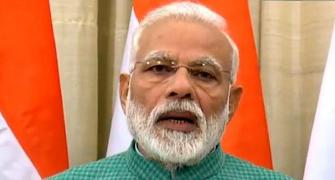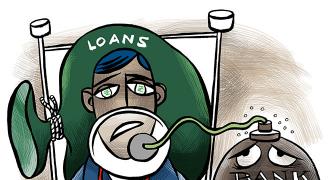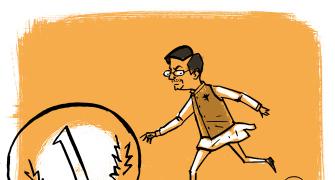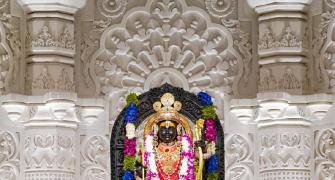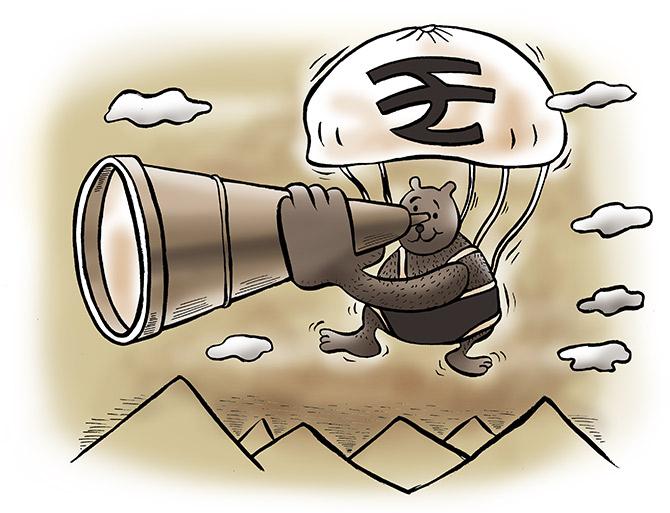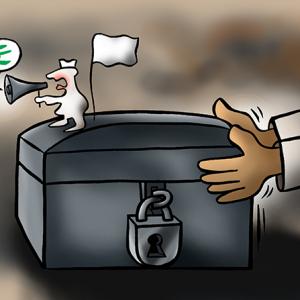There appears to be a growing perception among the political class that faster growth will not create jobs fast enough and, therefore, welfare spending needs to be drastically increased, says T T Ram Mohan.
Illustration: Uttam Ghosh/Rediff.com
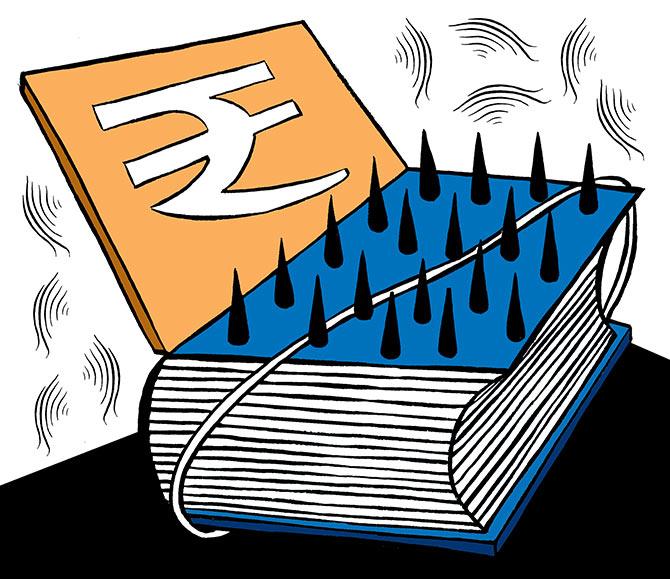
The interim Budget for 2019-20 has "general elections" writ all over it.
The big ticket item is, of course, the cash transfer scheme for farmers that will cost Rs 75,000 crore.
There is also an interest subvention of 5 per cent on timely repayment of farm loans.
The middle class is being wooed just as assiduously.
There is a doubling of the income tax exemption limit to Rs 5 lakh.
The standard deduction for salaried employees goes up from Rs 40,000 to Rs 50,000.
These two proposals themselves amount to giveaways of Rs 23,200 crore.
There is more in this vein.
For capital gains up to Rs 2 crore, rollover of capital gains under Section 54 of the Income Tax Act will be allowed for two residential houses instead of one.
The government's contribution to the New Pension Scheme for government employees has been increased from 10 per cent to 14 per cent.
For unorganised workers, the government dangles the prospect of pension of Rs 3,000 per month.
The cash transfer scheme is estimated to cover 12 crore farmers.
About 3 crore taxpayers will benefit from the increase in the exemption limit for income tax.
The finance minister has indeed cast the net for votes pretty wide.
The question, as always, is what the government's spending plans and giveaways mean for fiscal consolidation.
In the present Budget, the picture is rendered even murkier than usual by the latest gross domestic product (GDP) growth numbers released two days before the Budget.
The Budget estimates GDP growth of 7.2 per cent for 2018-19.
Based on the revised figures for 2016-17 and 2017-18 issued by the Central Statistics Office (CSO), it appears that GDP growth for 2018-19 would be closer to 6 per cent! The Budget for 2019-20 assumes nominal growth of 11.5 per cent which would translate into real GDP growth of almost 8 per cent (based on the earlier CSO estimates).
How the fiscal deficit-to-GDP ratio will pan out based on the revised GDP numbers is anybody's guess.
Even without this complication, the fiscal deficit-to-GDP ratio of 3.4 per cent for 2018-19 would be hard to meet without expenditure compression.
The revised estimates for 2018-19 assume total tax revenues to be in line with the Budget estimates when we know that so far tax revenues have lagged behind targets.
This allows the finance minister to actually show an increase in capital expenditure over the Budget estimate.
It is more likely that the figure for capital expenditure will end up getting pruned.
For 2019-20, the increase in tax revenues of 15 per cent seems reasonable compared with the increase of 19 per cent in 2018-19.
But it hinges crucially on an increase in goods and services tax (GST) collections of 18 per cent.
The Fiscal Responsibility and Budget Management (FRBM) Act target of a fiscal deficit-to-GDP ratio of 3 per cent is beginning to look like a distant dream.
The Finance Act 2018, moved the target of 3 per cent from 2018-19 to 2020-21.
The target for 2018-19 was set at 3.3 per cent and that for 2019-20 at 3.1 per cent.
The revised figures now are 3.4 per cent for both the years.
Meeting the target of 3 per cent in 2020-21 would be a tall order.
The time may have come to revisit the FRBM targets.
One reason is that the value of these targets is undermined by resort to off-budget financing, as the Comptroller and Auditor General report on FRBM performance in 2016-17 has pointed out.
The CAG recommends full disclosure of off-budget financing in the Budget.
Only then would we have a correct picture of fiscal deficits over various financial years and arrive at targets that are meaningful.
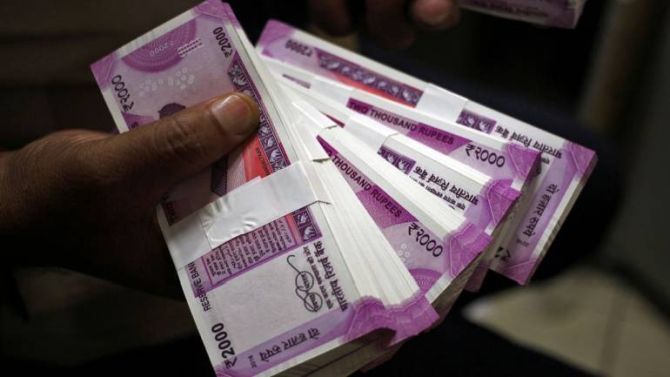
The other reason is that fiscal consolidation rests on a rising tax-to-GDP ratio and a declining expenditure-to-GDP ratio.
The Budget for 2018-19 held out the promise of both happening.
The tax-to-GDP ratio for the Centre rose impressively from an average of 10.2 per cent in 2010-15 to 12.1 per cent in 2018-19.
It was projected to rise further to 12.4 per cent and 12.7 per cent in 2019-20 and 2020-21 respectively.
The Budget for 2019-20 pours cold water on these hopes.
It shows the tax-to-GDP ratio as 11.9 per cent in 2018-19 and stagnant at 12.1 per cent in 2019-20 and 2020-21.
The truly bad news is on the expenditure side.
The total expenditure-to-GDP ratio declined from 14.3 per cent in 2010-15 to 13 per cent in 2018-19.
In 2019-20, it rises to 13.3 per cent.
This is only the beginning.
The cash transfer to farmers (which amounts to 0.36 per cent of GDP) is below the range of 0.5-1.5 per cent that most economists regard as reasonable support.
It is bound to rise further in the years to come.
There is no sign that subsidies will fall to make way for income support -- these remain at 1.4 per cent of GDP.
The notion of fiscal deficit falling steadily and making way for a rise in private investment and faster growth is beginning to look doubtful.
The failure to quickly resolve the twin balance sheet problem is hampering private investment.
The revised budget estimates for 2018-19 do not have the additional allocation promised for recapitalisation of public sector banks; the Budget for 2019-20 has no allocation at all.
More importantly, there appears to be a growing perception among the political class that faster growth will not create jobs fast enough and, therefore, welfare spending needs to be drastically increased.
In the medium term, there appears no easy way out of the combination of a fiscal deficit of 3.5 per cent and growth rate of 7.5 per cent.
T T Rammohan is a professor at IIM-Ahmedabad.


